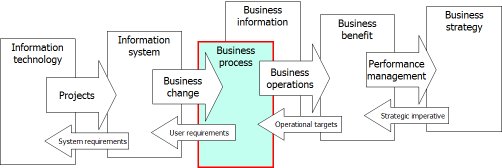IMBOK domains - Business processes

A business process is a logical envelope that co-ordinates and gives purpose to organisational activities; generally whereas an activity delivers an output, a process delivers an outcome - a result that is evident to stakeholders outside the organisation as well as those within.
Information systems are applied to business processes in order to improve them, and they bring data to the business that becomes useful as business information. Business systems (working within the business processes) are not the same as information systems - they include the envelope of human activity that makes things work. We may wish to make more widgets, or to make them more cheaply, or both; it is new business systems that will achieve this, not information systems alone. We may wish to increase the information content in our processes that deal with customers, so that we can relate to customers more closely - large businesses have become very interested in how they can use information technology to appear smaller through more intimate relationships with their customers; it is an improved business system that will achieve this, not a just a new database.
Related research: Outsourcing business processes
Lacity, M.C., Solomon, S., Yan, A. & Willcocks, L.P. (2011) Business process outsourcing studies: a critical review and research directions. Journal of Information Technology, 26 (4), pp.221-258.
Mary Lacity and her colleagues have undertaken a major review of prior research into business processes and the way that they are outsourced. Motivation to outsource is based on reducing costs, focusing on core capabilities and filling out other capabilities by accessing the skills of outsourcing suppliers. No real surprises so far. But organisations are less likely to outsource business processes that they are complex and critical in some way to business operations. To make the best of outsourcing, organisations need to have additional skills to deal with contracting, outsourcing supplier performance management, and a compatible culture. These things they consider to be comparable to the requirements and consequences of information technology and information systems outsourcing.
Some of the necessary research that they identify includes:
- Understanding the innovation that comes from outsourcing.
- Identifying the capabilities that must be retained by the outsourcing client - what do we still have to be able to do for ourselves?
- Investigating how different environments impact on outsourcing - it's not just about us (as clients) and them (as suppliers).
- Assessing other destinations besides India. India has been predominant, but what about other countries and regions?
- Outsourcing suppliers must have special capabilities but we do not yet understand them.
- Pricing models are changing, from full-time equivalent payments to pay-per-use or transactional methods - what other options are there?
- Organisations are awash with data - how might business analytics services supplement the sort of outsourcing services that are already established?
- What other emerging models and trends are there, for example the emergence of mulitple process outsourcing?
Finally, it's time (they say) that we had a fully developed BPO theory. We need to gather the constructs and characteristics of outsourcing business processes, and identify and record the patterns that work well or that work badly.
Related research: Seeing change happening, from the bottom up
Yoo, Y. (2010) Computing in everyday life: A call for research on experiential computing. MIS Quarterly, 34 (2), pp.213-231
Youngjin Yoo has written an interesting essay on how everday experience, with "computing", is changing the way we see information technology and information systems at work. He challenges information systems researchers to go back to basics, and acknowledge that the simple idea of experience is a proper starting point for six new areas of research. It's an excellent paper that is well worth reading, being quite different to some of the dry and (in my view) very shallow research that is published today.
